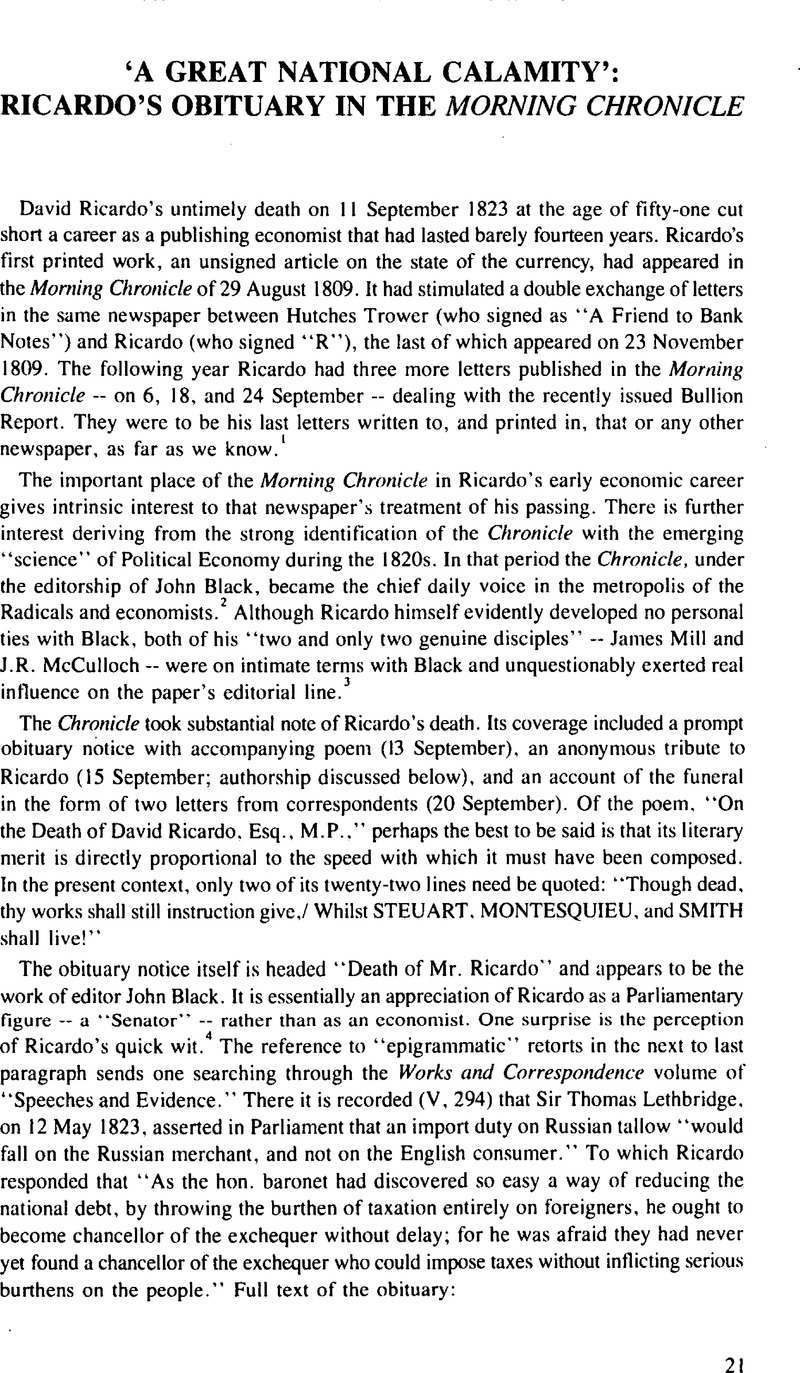No CrossRef data available.
Published online by Cambridge University Press: 11 June 2009

1 For Ricardo's contributions to the Morning Chronicle, see Works and Correspondence of David Ricardo, ed. Piero, Sraffa (Cambridge: The University Press, 1951), III, 15–33Google Scholar, 131–153. See, too, the “Draft of a Letter to a Newspaper on the Effects of Peel's Bill,” which Ricardo probably wrote in late 1821 but apparently never published, in Works and Correspondence, V, 515–521.Google Scholar
2 See Geoffrey, Gilbert, “The Morning Chronicle, Poor Laws, and Political Economy,” History of Political Economy, 17 (Winter 1985), 507–521.Google Scholar
3 The phrase in quotes is from a letter Mill wrote to McCulloch one week after Ricardo's death. Sraffa includes the letter in Works and Correspondence, IX, 391. Mill took this occasion to suggest a “lectureship of political economy” as a fitting memorial to their departed friend. The Ricardo Lectureship on Political Economy was duly established, with McCulloch as lecturer.Google Scholar
4 Also noteworthy is the omission of any mention of Ricardo's letters published in the Morning Chronicle in 1809–10. The most plausible explanation: John Black's unfamiliarity with the letters. It had been Black's predecessor, James Perry, who approved their publication; Perry died in 1821.
5 Bain, , James Mill: A Biography (London: Longmans, Green, 1882CrossRefGoogle Scholar; reprinted by Gregg International Publishers, 1970), pp. 211-213; Weatherall, David Ricardo: A Biography (The Hague: Martinus Nijhoff, 1976), p. 187. The report is that of Mrs. George Grote (see Bain, op. cit., p. 211).
6 On Mill's hopes to broaden Ricardo's horizons to include the “science of legislation,” see his letter to Ricardo of 3 December 1817 (Works and Correspondence, VII, 210-213); and Donald Winch, “The Cause of Good Government: Philosophic Whigs versus Philosophic Radicals,” in Collini, Winch, and Burrow, , The Noble Science of Politics: A Study in Nineteenth-Century Intellectual History (Cambridge: The University Press, 1983), esp. pp. 115–116Google Scholar.
7 Professor John P. Henderson has suggested, in correspondence, that Mill's absence can be explained by the mutual antipathy between Mill and some of the Ricardos. (For evidence, see Works and Correspondence, VI, 49, 56; VII, 303). Henderson also notes a discrepancy between the Chronicle's count of Ricardo's brothers at the funeral (six) and Moses Ricardo's recollection (seven), see Works and Correspondence, X, 12). Finally, Henderson challenges the notion that women ordinarily did not attend funerals in this era. They did not attend when the person being buried was a Jew. Thus Ricardo's female relations stayed away from the ceremony in deference to the orthodoxy of some of the Ricardo brothers.
8 Works and Correspondence, VII, 365.
9 Gordon, Barry names Hume the most consistent backer of Ricardo's policies in Parliament “with the possible exception of George Philips,” in Political Economy in Parliament, 1819-1823 (London: Macmillan, 1976), p. 189, n. 26.CrossRefGoogle Scholar
10 Works and Correspondence, V, 332 (12 February 1824). For an estimate of Joseph Hume's influence in Parliament, see Fetter, Frank, The Economist in Parliament, 1780-1868 (Durham: Duke University Press, 1980), pp. 234–235.Google Scholar
11 Keynes, J.M., Essays in Biography (London: Macmillan, 1933), pp. 148Google Scholar;Works and Correspondence, IX, 382
12 Works and Correspondence, IX, 377.